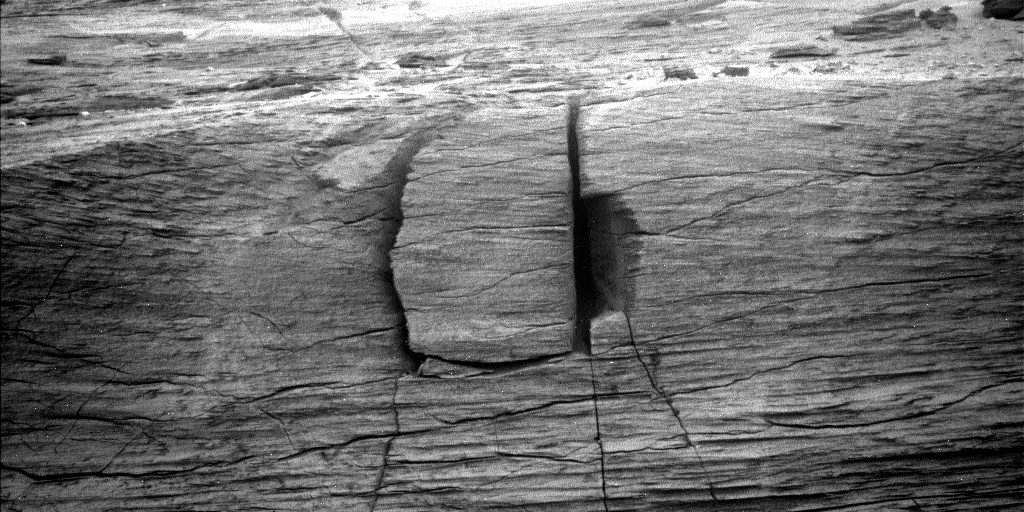The shattered cliffs of Mount Sharp
Cool image time! The picture above was taken on August 11, 2022 by the left navigation camera on the Mars rover Curiosity. It shows a great example of the strange manner in which the bedrock in the layered cliffs on Mount Sharp appear to break apart.
I am not certain exactly where this feature is, or its exact scale, but based on the date and where Curiosity was located when the photo was taken, it likely is a small section from one of two hills, Deepdale and Bolivar, that Curiosity passed between in mid-August. It is likely somewhere in the panorama included in my August 11th post, but I have not yet been able to locate it.
Nonetheless, the breakage here is typical of these cliff faces. The structural strength of these layered hills is not very high, so at some point one section can break away from another as the hill sags downward to the left. What makes the cracks here more intriguing is that something caused the higher sections surrounding the main block to widen. On Earth we would assume that this widening was caused by rainwater pouring in from the top. On Mars, that explanation doesn’t hold water.
Wind? Seasonal thermal changes? Neither explains the change in the width of the cracks along their length. Maybe the wider cracks indicate an increased sagging of the hill to the left. The layers below this broken block have simply not slid to the left as much.
On Christmas Eve 1968 three Americans became the first humans to visit another world. What they did to celebrate was unexpected and profound, and will be remembered throughout all human history. Genesis: the Story of Apollo 8, Robert Zimmerman's classic history of humanity's first journey to another world, tells that story, and it is now available as both an ebook and an audiobook, both with a foreword by Valerie Anders and a new introduction by Robert Zimmerman.
The print edition can be purchased at Amazon or from any other book seller. If you want an autographed copy the price is $60 for the hardback and $45 for the paperback, plus $8 shipping for each. Go here for purchasing details. The ebook is available everywhere for $5.99 (before discount) at amazon, or direct from my ebook publisher, ebookit. If you buy it from ebookit you don't support the big tech companies and the author gets a bigger cut much sooner.
The audiobook is also available at all these vendors, and is also free with a 30-day trial membership to Audible.
"Not simply about one mission, [Genesis] is also the history of America's quest for the moon... Zimmerman has done a masterful job of tying disparate events together into a solid account of one of America's greatest human triumphs."--San Antonio Express-News
Cool image time! The picture above was taken on August 11, 2022 by the left navigation camera on the Mars rover Curiosity. It shows a great example of the strange manner in which the bedrock in the layered cliffs on Mount Sharp appear to break apart.
I am not certain exactly where this feature is, or its exact scale, but based on the date and where Curiosity was located when the photo was taken, it likely is a small section from one of two hills, Deepdale and Bolivar, that Curiosity passed between in mid-August. It is likely somewhere in the panorama included in my August 11th post, but I have not yet been able to locate it.
Nonetheless, the breakage here is typical of these cliff faces. The structural strength of these layered hills is not very high, so at some point one section can break away from another as the hill sags downward to the left. What makes the cracks here more intriguing is that something caused the higher sections surrounding the main block to widen. On Earth we would assume that this widening was caused by rainwater pouring in from the top. On Mars, that explanation doesn’t hold water.
Wind? Seasonal thermal changes? Neither explains the change in the width of the cracks along their length. Maybe the wider cracks indicate an increased sagging of the hill to the left. The layers below this broken block have simply not slid to the left as much.
On Christmas Eve 1968 three Americans became the first humans to visit another world. What they did to celebrate was unexpected and profound, and will be remembered throughout all human history. Genesis: the Story of Apollo 8, Robert Zimmerman's classic history of humanity's first journey to another world, tells that story, and it is now available as both an ebook and an audiobook, both with a foreword by Valerie Anders and a new introduction by Robert Zimmerman.
The print edition can be purchased at Amazon or from any other book seller. If you want an autographed copy the price is $60 for the hardback and $45 for the paperback, plus $8 shipping for each. Go here for purchasing details. The ebook is available everywhere for $5.99 (before discount) at amazon, or direct from my ebook publisher, ebookit. If you buy it from ebookit you don't support the big tech companies and the author gets a bigger cut much sooner.
The audiobook is also available at all these vendors, and is also free with a 30-day trial membership to Audible.
"Not simply about one mission, [Genesis] is also the history of America's quest for the moon... Zimmerman has done a masterful job of tying disparate events together into a solid account of one of America's greatest human triumphs."--San Antonio Express-News



What could cause this? Perhaps a meteorite strike on the plane above? – conjecture